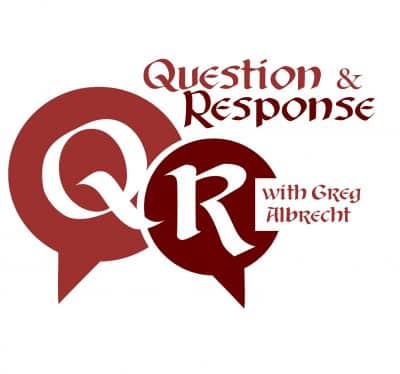Can we ‘make’ God love us more or less? – Brad Jersak
“We need to let it soak in that there is nothing we can do to make God love us more…and nothing we can do to make God love us less.” – Philip Yancey
“We all need to know that God does not love us because we are good; God loves us because God is good. Nothing humans can do will ever decrease or increase God’s eternal eagerness to love.” – Richard Rohr
I remember when I first heard these kind of statements and sort of cringed. I was suspicious that those who echoed Philip Yancey or Fr. Richard might employ them to imply, “So it doesn’t matter what you do.” I don’t think I hear Jesus saying, “It doesn’t matter what you do,” and in fact, that’s certainly not what Yancey or Rohr are implying either. I believe it’s pretty obvious that God (through Christ and in these two fine teachers) wants us to love others and emulate his grace and mercy in our lives. That matters a lot! And it seems God has also made it clear that harming others, or judging and condemning them is something he’d want us to turn from as we grow up. Discovering God’s infinite love for us isn’t simply a green light for an “anything goes” attitude.
But implications and suspicions aside, the more I soak in the New Testament Gospels and epistles, and as I continue through to the early church fathers and mothers, the more I see how and why these opening aphorisms are exactly right.
First, consider the phrase, ‘there’s nothing you can do to make God.’ This is absolutely true: no one can ‘make God’ do or be anything other than what he is. That is, God loves us with an infinite love, because God IS love … but nothing in heaven or earth or under the earth can constrain God to love us or not love us. His love is what the ancient theologians called a ‘self-donation.’ We don’t seduce his love by being either adorable or pathetic — his love flows entirely from his nature and is utterly voluntary. He is “moved to compassion,” not because we ‘trigger’ him or manipulate him with our pleas, but rather, because God is compassion itself and his love flows without ceasing wherever and to whomever it is received. My experience of God’s love may fluctuate as I welcome it or rebuff it, but God himself cannot be said to love us more or less, as if his very nature was dependent on our behaviour or jerked around by our emotional rollercoaster rides.
Why not? Because for God to be God means that he is the infinite perfection of all we call goodness and love. God can’t become more than perfect or more than infinite. God cannot become more loving or more God. If he could become 1% more, that would mean he’s only 99% now … and that would be 1% less than God. Get it? And he cannot become less in any way — less God, less infinite, less love — because that would diminish him. And to diminish God even 1% would mean he would no longer be the perfection of love — would no longer be God.
Now add to this the rather ridiculous notion that something we do could cause God to be more or less than he is. If my behaviour could ‘make’ God love me even 1% more or 1% less — that would be saying I could make God bigger or smaller, more God or less God. That seems to me the height of arrogance or the depth of ignorance, but don’t we all slip into that thinking now and then? I suppose it’s part of the human condition. But it’s surely not part of the divine condition.
This can make God sound rather static. But he isn’t. While God is not ever constrained or triggered or rattled or seduced or manipulated, this doesn’t mean God is static or stationary. God may be immovable, but he is not immobile. God’s infinite love (that is, God himself) is an infinite spring — [the Source never diminishes] — in an unceasing flow — [the River never stops]. While every metaphor has its limits, imagine the love of God (and God IS love) as a powerful waterfall, infinitely bigger and more powerful than Niagara Falls. Imagine that no matter how much volume of life-giving water is poured out, the Source never diminishes at all. There will never be less love in the infinite Spring that sends the water. And imagine that the waterfall itself constantly and continuously gushes in a way that can’t be increased or decreased … the gallons per second is measured as absolutely steady because it is also infinite. The fact that the waterfall never ceases, never freezes over, never runs out and never goes away doesn’t really make it static, does it? It is immovable but it is not immobile. This, I believe, is what some theologians meant by “God is pure act” and others imply by “God is a verb.” Of course, none of this quite gets at the mystery.
But here is the point: what if we hopped into a little raft (our lives as individuals) or piloted a huge ship (any human movement or nation) — and what if we ventured into the waters beneath this infinite source and flow of divine love: do we think that turning right or left would ‘make’ the waterfall increase or decrease in its infinite volume? Do we think that paddling harder or just relaxing in the boat would have any impact whatsoever on the flow? Would it diminish or supplement the bottomless Spring at all? Of course not. There is no raft or ship or dam big enough or strong enough that could clog up or slow down the ever-enduring mercies and everlasting loving-kindness of this infinite Love, this eternal God.
Now, what we do in our boats or with our boats still matters. God still may say turn right rather than left so you don’t run aground on the rocks. God may still say paddle harder or stop paddling to help us not ram into other boats. We’re not saying ‘anything goes’ or ‘it doesn’t matter.’ But we are saying, left or right, faster or slower, sink or swim — as important as they are — doesn’t increase or diminish the flow of his love.
At the same time, just because our behaviour doesn’t affect God’s love, that doesn’t mean God’s love has no effect on us! In our little analogy, I would only suggest that flowing with God’s love is going to be easier than fighting against the current. And so the great discovery and exhortation of all the great spiritual teachers and mystics has always been, “Surrender.” Surrender to the flow of God’s love. Let it carry you along. Join in with it. Flow with him. Imagine that Source gushing up inside you and flowing through your life through surrender.
In Galatians 2, when Paul says, “I am crucified with Christ,” he means, “I surrendered. I let go. I stopped fighting the flow. Stopped kicking against the goads.” When he says, “Nevertheless I live, yet not I, but Christ lives within me,” he means that he stopped making it about religious paddling for God’s love and let Christ’s love carry him along.” When he says, “And now the life I live, I live by faith in the Son of God,” he means that he’s trusts the flow of Christ within him and flows with that love. He stopped trying to ‘make’ God love him more because nothing he had done ever ‘made’ God love him less. And so in Ephesians 3, Paul prays for us too, that we too would see how high and wide and long and deep the love of God — oceans of it — is for us.
Lord, let it be!












 Plain Truth Ministries | Box 300 | Pasadena, CA 91129-0300
Plain Truth Ministries | Box 300 | Pasadena, CA 91129-0300

